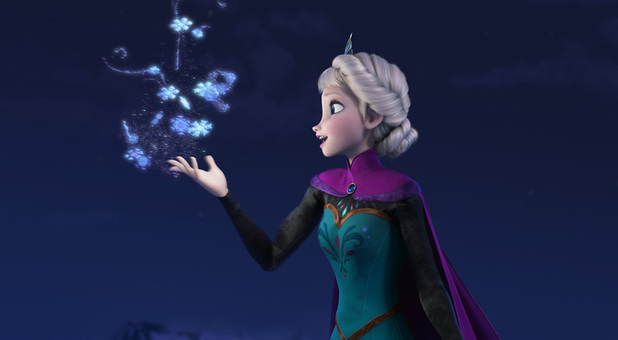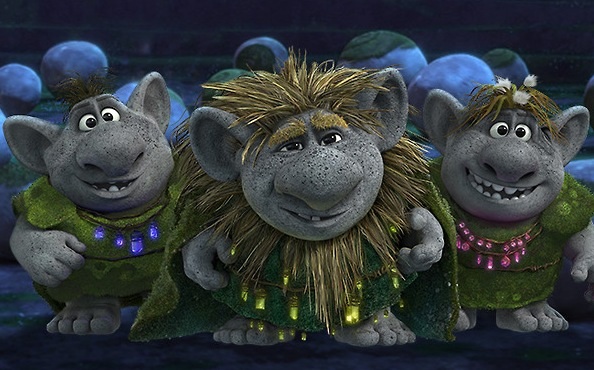Disney's FROZEN

All Elsa wants to do is to figure out this gift she has - or is it a curse - wherein she can shoot out literal winter from her fingertips and create snow and ice all around her. But it's what starts out as a trick as a child, something to impress her little sister Anna. But when Anna is injured, her parents, the King and Queen of Arendelle, take her to a magical troll who repairs Anna's brain - to forget her sister ever had magic, and for their childhoods the parents separate the sisters (the parents die, but this is almost treated as an aside in the film, why this isn't dealt with more I don't know, it's one of those things for story sake and it would stretch out the run time I guess).
By the time they're grown-up, Anna is a sort of typical fun-and-happy good-natured Disney Princess, and Elsa is being coronated as the queen. Anna does that all-too-typical thing of falling for the first cute guy that comes in her path, and Elsa, thankfully, doesn't see why she should get married so quickly. In a moment of mistake, Elsa lets down her guard and lets loose some of her icy-magic, and its finally what lets the kingdom know her secret. She runs off to her own self-made ice palace on a mountain, and from here the rest of the story takes shape as Anna just has one simple task: reach out to her sister, and stop winter from over-taking the kingdom (it's summer at the time).

This all sets the stage for what is a quality Disney Animation production - once again following 2010's Tangled and 2009's Princess and the Frog under the tutelage of Pixar chief John Lasseter (he now heads all Disney animation) - and a story that features two things that I really found greatly interesting, compelling, and made for a much richer experience than I had expected as far as the usual lot of Disney animated musicals go. And lest not forget it's a true-blue Disney musical with Princess and Queens and magic kingdoms and talking creatures and things (this time a snowman, Olaf, sort of created by the girls as kids for fun and back with the kid-like perspective brought by Josh Gad).
What makes this different? First is the treatment of Anna (charmingly voiced by Kristen Bell) as a seemingly typical Disney princess. Gone is the reverence of a Sleeping Beauty or Snow White, and as with the main character in the Rapunzel adaptation Tangled this film treats its teenage girl as a little bumbling, jokey, almost self-aware of some of her clumsy ways but not to the point where she comes off like a ditz. But what's most gratifying is that the filmmakers, Chris Buck and Jennifer Lee, did something I didn't expect: they pull a criticism of this sort of Disney Princess type while showing her.

She falls for a young would-be Prince Hans (Santino Fontana), and of course they have the meet-cute as she almost falls off a boat early on and he's the oh-so-dreamily-drawn type and the two even share a musical number, "Love is an Open Door". Later this musical number almost seems like a parody of itself (though for its intended audience, little kids and especially little girls, it will be sincere and it works fine and well for them) - Elsa, as well as Kristoff, the man Anna has to have help her find a way up the mountain to speak with Frozen-Ice-Castle-Bound Elsa, all make light of the fact that this love-at-first-sight-let's-get-married business is a bit rushed, and that doesn't know much about this man except that he is the youngest of twelve brothers and has a last name 'Of (insert place here').
It's one thing to have to buy into, say, the love-at-first-sight tale of The Little Mermaid (also a Hans Christen Andersen story), but it's another to get filmmakers who understand this lineage and bring another element into it - something that can be a useful criticism that kids can keep in mind as well. This also comes into play later in the film when a greater conflict is introduced, one that could bring tragedy to all the main players. But no spoilers, for now.

The other key element is with Queen Elsa. She is a "villain" in the sense that she does something wrong and it could possibly doom the whole kingdom. But it's really a case of being her own worst enemy, and her sister knows, despite being estranged from her for most of their adolescences, that there is good in her too. In a weird way though Elsa becomes more of a supporting character as the story goes into its mid-section, as the adventure for Anna and Kristoff hits off, Elsa is really the most complex of any character in the movie: a girl alienated by her ability, unable to bring it to fruition, and when it does it actually, kinda, really, feels GOOD.
This is highlighted by, arguably, the best song in the film "Let it Go" where Elsa (voiced and sung by a tremendously gifted singer and actress, Idrina Menzel) sings out by herself about the pleasure of embracing her abilities she's shunned for so long. It's a song filled with deep-rooted pain and resentment, but a kind of high-flying joy of, as the song posits, letting the hell GO and being oneself. It's not a tidy message, and yet I think kids will identifying with the simple pleasure in being oneself; if an X-Men character were to have a musical number upon entering Xavier's School, it might be this.

These two elements keep things steady in Frozen with these two characters, Anna and Elsa, and how the filmmakers are able to get a good deal of conflict and drama in what the characters want and need (Anna is also put into a love triangle, perhaps a bit obvious, but hey it's Kristoff the lad with an adorable reindeer named Sven vs. an all-too-perfect Prince, so figure). There's also a slightly simplistic message about fear and hate vs. love, but this is the part of the Disney musical package after all, and the quality of the action, singing, and especially the animation where every snow-flake and bit of ice looks painstakingly drawn and detailed.

There's even some cute comedy from Olaf the snowman ('cute' cause he's the real innocent of the story, enough to sing a song about how much he wants to be in summer-time), and little asides from the Duke of Weselton - not "Weasel"-ton as it's pronounced, he reminds people - who is basically a royal stooge out for extra money from the kingdom (though he is a little under-developed as a character and sorta-side villain- but at leasy Alan Tudyk is there to provide a distinct and despicabe-fun side character).
So much is so well put together in Frozen that it pains me the songs aren't, for the most part, better or just more memorable. Perhaps if one is really into musicals in general, of the Broadway variety, some numbers like the times Anna and Elsa sing together ("For the First Time in Forever", which gets reprised), have their moments. But aside from Elsa's showstopper on the mountain, none of the songs were that striking, even as they did help at times to advance the story forward or note on character (i.e. the magical trolls singing about Anna and Kristoff getting together).
- (I may just be a bit jaded after years of so-so musicals in the late 90's (Tarzan, Mulan), or thinking of the high standard of those in the late 80's and early 90's (Aladdin, Little Mermaid, Lion King). But will little kids be singing these years from now? Do they jump off the screen? Not really. Yet they are not bad enough to be tossed aside either; if you get the Frozen soundtrack for yourself or your kids, I wouldn't look down on that for a minute - at the least the film does a decent job of getting a character to start talking in song and mixing it up a little (looking at you, Les Miserables).)



Comments
Post a Comment